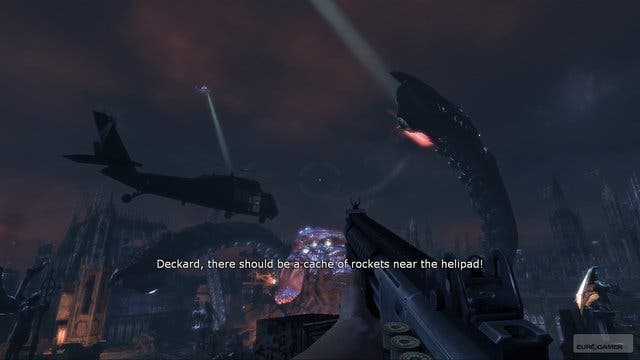Legendary
Not really.
Calling a game Legendary is either an act of supreme confidence or foolhardy hubris, especially when your last entry into the first-person shooter was the thoroughly dire Turning Point: Fall of Liberty. That's the position that developer Spark Unlimited finds itself in, and after only a few hours play you'll start to suspect that a more honest - though less marketable - title would've been Hilarious.
As in hilariously bad. Any hopes that Spark might have learned from the myriad flaws painstakingly pointed out in dozens of reviews for Turning Point is dashed almost immediately. In almost every respect, Legendary is exactly the same game but with the Nazi invasion of America replaced with an invasion of mythical beasts.
They've accidentally been released from Pandora's Box by our hero, Charles Deckard, you see. He's a blank slate of a thief, hired by a mysterious character to retrieve the fabled artefact, and in doing so he only goes and pops it open. Even the ancient Greeks understood that Pandora's Box was a metaphorical representation of mankind's capacity for evil and suffering, so the fact that the game labours under the impression that it's literally a box full of monsters, which looks like the Ark of the Covenant, should give you some idea of the level of creative innovation on display. That the monsters in question are drawn from Greek, Norse, medieval and even Jewish mythology simply confuses matters even more.

At least the opening of the box gives us our obligatory opening set-piece, as New York's Natural History Museum is torn asunder by the outpouring of evil monster energy in a scene crudely swiped from Ghostbusters. Just as Turning Point started with a series of staged sequences as you descended through a skyscraper construction site while German troops parachuted around you, so Deckard must scramble out of the museum as fire-spitting creatures chomp on civilians. As in Turning Point, it feels stagey and fake, and there's no sense of danger since every single moment is so obviously scripted. Try and shoot the griffins busy devouring bystanders on the street and your bullets pass right through. They're not actually there, you see. It's just scenery on a low-rent ghost train.
From there, it's a rapid slide past mediocrity into just plain bad. The aiming is better than it was in Turning Point, but that's hardly high praise. The twitchy crosshairs still fail to compete with any other current first-person shooter, while the generally unresponsive movement controls hamper your progress once again. Scenery snags are common, while the game goes out of its way to block your path with stupid and illogical obstacles. Deckard is apparently a very lethargic man, since he's completely incapable of jumping more than one foot off the ground, or pulling himself up onto waist-high objects. This means, for instance, that a simple handrail forces you to laboriously make your way around, over, out and through a protracted series of conveniently crashed subway cars simply to reach a door ten feet from where you started.


